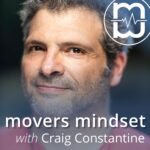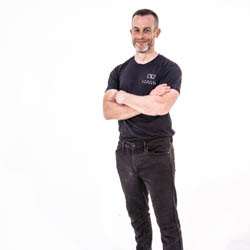
How can a coach ensure their students surpass their own skills and preserve the essence of parkour over generations?
Andy Pearson unpacks why he considers himself a failed coach, and dives into what he believes his job as a coach to be. He shares his insights on where to look for coaching and training inspiration outside of parkour, before going through the litany of injuries he’s had, and explaining how they have shaped his training. Andy discusses his current training and how he expects it to grow and evolve, before wrapping up with his thoughts on FIG and the Olympics.
“There are a lot of kids out there that are much, much better than I am […] I was thinking about this metric: Out of all of my students, can I actually think of anybody that has gone on and I’ve actually made them better than I am? I’m not talking about them. I’m talking about my ability as a coach, and therefore am I failing? Am I failing because therefore there’s going to be this dilution. Because if they then go on to be coaches and they do the same thing to their students and so on and so forth, are we going to be gradually losing what it means? …what parkour is about?” ~ Andy Pearson (6:00)
The conversation explores Andy’s reflections on his coaching career, questioning whether his methods genuinely allow students to surpass his own abilities. Andy grapples with the idea that shielding students from the mistakes he made may unintentionally dilute essential learning experiences. He discusses how past injuries and his evolving perspective on training are reshaping his coaching philosophy.
Andy highlights the value of exploring strength and conditioning disciplines outside of parkour to enhance his coaching. He references strength coaches like Mark Rippetoe and training systems like StrongFit as critical resources. The discussion also touches on the contrast between structured coaching environments and the organic, unstructured paths taken by top parkour athletes, raising questions about the future direction of parkour training.
Takeaways
Training outside parkour — Exploring strongman training, Olympic lifting, and powerlifting provides valuable insights for improving parkour coaching.
Student progression — A key measure of a coach’s success is the number of students who surpass their abilities.
Injuries and resilience — Past injuries inform coaching methods, shaping approaches to protect students without limiting their growth.
Organic learning — Some of the best parkour practitioners develop without formal coaching, raising questions about the effectiveness of structured classes.
Strength programming — Applying principles of strength programming to parkour can help athletes break through plateaus and build resilience.
Resources
Starting Strength — Mark Rippetoe’s comprehensive guide to strength training fundamentals.
Practical Programming for Strength Training — Mark Rippetoe’s’ follow-up to Starting Strength, this book dives deeper into programming and periodization for strength progression.
Jim Wendler’s 5/3/1 Program — A simple and effective strength training program designed for long-term progress, emphasizing core lifts and incremental gains.
Precision Nutrition — A leading educational platform for nutrition coaching and certification, providing in-depth resources on diet, health, and athletic performance.
Barbell Shrugged Podcast — A podcast and video series that explores fitness, strength training, CrossFit, and the business of health and wellness.
Pavel Tsatsouline Resources — Pavel is known for popularizing kettlebell training in the U.S. and offers resources on strength training and conditioning, particularly for military and special forces applications.
(Written with help from Chat-GPT.)
— Hello👋 I’m Craig Constantine.
In the Movers Mindset podcast, I talk with movement enthusiasts to learn who they are, what they do, and why they do it. I’m interested in the nature and philosophy of movement and in exploring themes like independence, self-direction, and human excellence. My interests color each conversation and provide some structure to Movers Mindset. But since I like to take the scenic route, every conversation ends up going somewhere unique.
The purpose of Movers Mindset is to create and share great conversations with movement enthusiasts. Each conversation feeds my insatiable curiosity, but I share them to turn on a light for someone else, to inspire them, or to give them their next question.
I appreciate your time and attention, and I don’t take it for granted.
— Thank you!
Want more? Subscribe to the email list for weekly updates—new episodes and archive highlights delivered to your inbox.
I invite you to cultivate a meaningful life—through presence, not pursuit. You can learn more about me and all my projects at, https://craigconstantine.com.
If you like what I’m doing through Movers Mindset, learn more about becoming a patron.
ɕ
